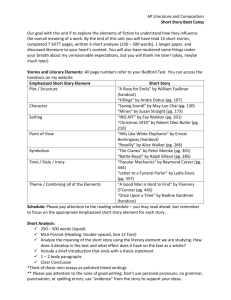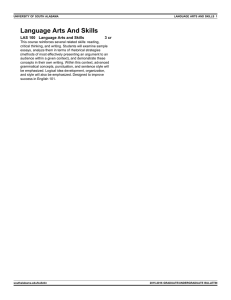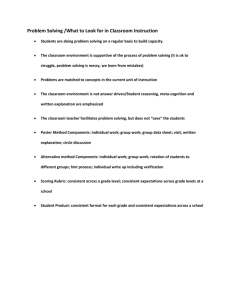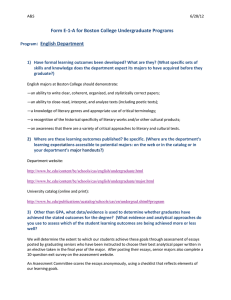STUDENT OUTCOMES ASSESMENT PLAN BA IN ENGLISH
advertisement
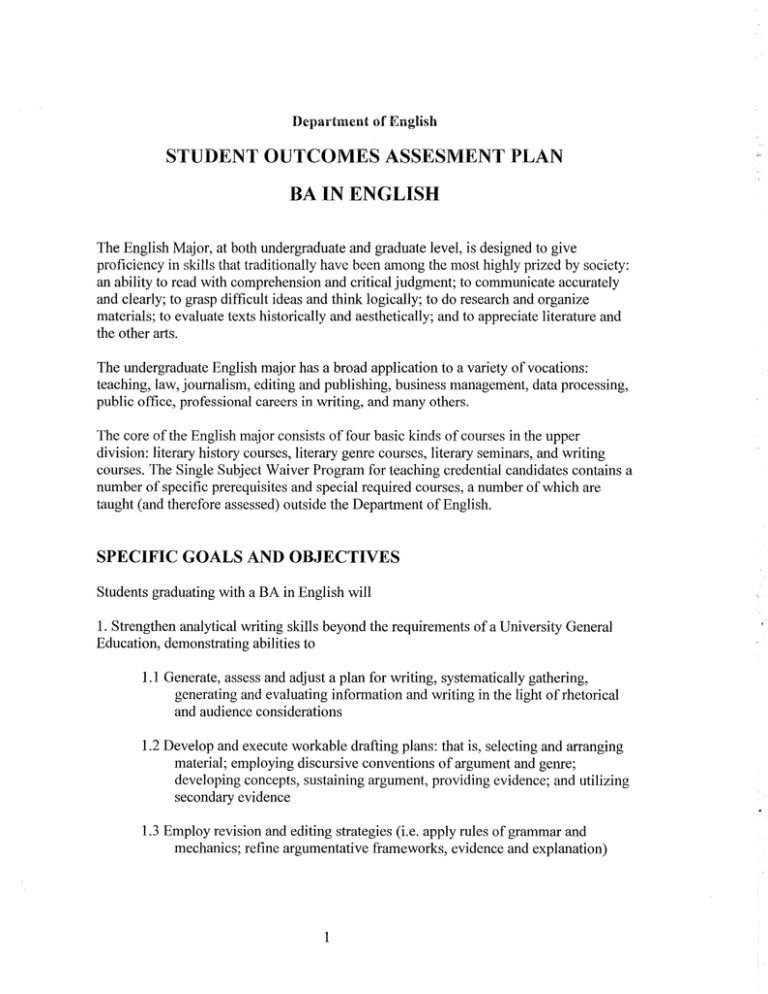
Department of English STUDENT OUTCOMES ASSESMENT PLAN BA IN ENGLISH The English Major, at both undergraduate and graduate level, is designed to give proficiency in skills that traditionally havc been among the most highly prized by society: an ability to read with comprehension and critical judgment; to communicate accurately and clearly; to grasp difficult ideas and think logically; to do research and organize materials; to evaluate texts historically and aesthetically; and to appreciate literature and the other arts. The undergraduate English major has a broad application to a variety of vocations: teaching, law, journalism, editing and publishing, business management, data processing, public office, professional careers in writing, and many others. The core of the English major consists of four basic kinds of courses in the upper division: literary history courses, literary geme courses, literary seminars, and writing courses. The Single Subject Waiver Program for teaching credential candidates contains a number of specific prerequisites and special required courses, a number of which are taught (and therefore assessed) outside the Department of English. SPECIFIC GOALS AND OBJECTIVES Students graduating with a BA in English will 1. Strengthen analytical writing skills beyond the requirements of a University General Education, demonstrating abilities to 1.1 Generate, assess and adjust a plan for writing, systematically gathering, generating and evaluating information and writing in the light of rhetorical and audience considerations 1.2 Develop and execute workable drafting plans: that is, selecting and arranging material; employing discursive conventions of argument and geme; developing concepts, sustaining argument, providing evidence; and utilizing secondary evidence 1.3 Employ revision and editing strategies (i.e. apply rules of grammar and mechanics; refine argumentative frameworks, evidence and explanation) 1 2. Read critically, demonstrating abilities to 2.1 Control the literal meaning of a text, generate an interpretation of a text, and articulate the value associated with experiencing the text 2.2 IdentifY and explain the aesthetic choices that writers use in creating a text 2.3 IdentifY generic features and structures of a text and explain the relation between structure/form and ideas 2.4 Apply critical paradigms and make connections between their readings of texts and those produced by peers, professors, scholars and critics 3. Familiarize themselves with literary research methodology, demonstrating abilities to 3.1 Use library/information resources for research, that is, locate those periodicals, journals, scholarly monographs, e-sources, etc. which will provide insight into a literary text. 3.2 Generate an annotated bibliography 3.3 Evaluate and hierarchize significant research texts 4. Acquire a working knowledge of and familiarize themselves with the evolving literary canon of English, American and world literatures, including 4.1 A wide variety of works and authors within the appropriate historical contexts for reading and reception 4.2 Culturally significant narratives, including the Bible, folklore, mythology, which inform and provide contexts to literature 4.3 The various canons and significance of processes of canon formation 4.4 The themes, concepts and values associated with national, ethnic and minority literatures 5. Acquire a fundamental knowledge of and working familiarity with the tradition and applications of literary criticism, including 5.1 The history of English as an academic discipline and the political, ideological and cultural forces shaping the enterprise of criticism 5.2 The hierarchical concepts of criticism and their influence on reading, writing and pedagogy 2 5.3 The current critical paradigms which elaborate appropriate cultural, historical, gender, psycho-social, political, geographical, racial, linguistic and philosophical contexts for reading and writing ACHIEVEMENT OF GOALS AND OBJECTIVES The English Major as presently configured addresses these goals and objectives through the following courses. The skills as an aggregate, however, are integrated and applied in all upper division courses. Goal 1 Introduced in Emphasized in English 20, 21, 44 English 105, 164 Introduced in Emphasized in English 20, 21 English 105 Introduced in Reinforced in English 105 All Upper Division Courses Introduced in English 31,32, 105 Goa12 Goa13 Goal 4 Objective 4.1 Emphasized in English 112, 113, 114, 146, 147, 150, 151, 152, 153, 154, 155, 156, 169T, 174, 176T Reinforced in English 184, 187, 189 Objective 4.2 Emphasized in English 115, 116, 167 3 Objective 4.3 Emphasized in Reinforced in Objective 4.4 Emphasized in English 112, 113, 114, 146, 147, 150, 151, 152, 153, 154, 155, 156, 169T English 184, 187, 189 English 112, 113, 114, 167, 168T 169T (Selected Topics) GoalS Introduced in English 105 Emphasized in English 181 The Undergraduate English Major culminates in a final application of the skills defined in Goals 1 - 5 in the required senior seminars, English 193T and 194T. PROPOSED ASSESSMENT ACTIVITIES 2004-2005 Surveys of current Undergraduate students and of recent alumni, in conjunction with the preparation of Department Self-Study, as part ofthe Department's periodic Program Reviews (Responsible Department Committee: Program Review) 2005-06 Development of Exit Survey, to be administered to all Undergraduate English majors as they apply for graduation (Responsible Department Committee: Assessment) 4 2006-07 Development of scoring rubric and holistic reading of 105 essays (Specific Goals to be assessed: 1,2,3) (Responsible Department Committee: Assessment, augmented by cadre of current and recent 105 instructors) 2007-08 Analysis ofGRE (Verbal and/or Subject Tests) of recent graduates applying to MA and PhD programs (Responsible Department Committee: Assessment) 2008-09 Development of scoring rubric and holistic reading of 193T and 194T term paper/essays (Specific Goals to be assessed: 3, 4, 5) (Responsible Department Committee: Assessment, augmented by cadre of current 193T and 194T instructors) 2009-2010 Development of Scoring Rubric and holistic reading of Undergraduate essays, short stories and poems published in CSUF student critical and creative writingjoumals and lor presented at Department or University sponsored colloquia and conferences (Responsible Department Committees: Assessment, Graduate and Creative Writing) 2010-2011 Surveys of current Undergraduate students and of recent alumni, in conjunction with the preparation of Department Self-Study, as part of the Department's periodic Program Reviews (Responsible Department Committee: Program Review) 5

